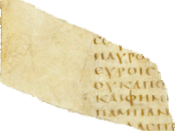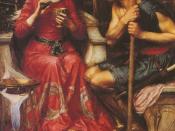'Death is my wish for myself, my enemies, my children' (Euripedes translated by
Robinson Jeffers, Medea 11). Medea is hungry for death. She wants to taste it on her lips and
wishes others to do the same. The value which Medea gives death is to use it as a weapon against
her enemies. On the other hand, the women and the nurse fear death. Death, to the women and
to the nurse is something that should not be wished for. 'O shining sky, divine earth, Harken not
to the song that this woman sings' (13). One of the Greek women says this, for Medea is
screaming out that she would like to die. The women and the nurse hear Medea wishing for death
as if it were a treasure or something valuable.
The nurse and women are not in agreement with Medea's view of death. To them, death
would be something that lurks around anything and anywhere waiting to strike.
'He strikes from
the clear sky like a hawk, he hides behind green leaves, or he waits around the corner of a wall'
(12). To a Greek woman death is personified as a hunter or killer. She uses an animal, the hawk,
to compare to death. A hawk is a swift predator that attacks unnoticed, but to Medea death is
a trophy.
For Medea death has a value of importance. A friendship has been established. Death is
Medea's friend. She uses it as a weapon to get what she views as justice. 'Then if you have a dog
eyed enemy and needed absolute vengeance . . . Unchild him, ha? And then unlife him' (23).
Medea believed with great depth to get vengeance upon Jason. She wanted to go through with
her vengeance and hurt Jason as Jason...


